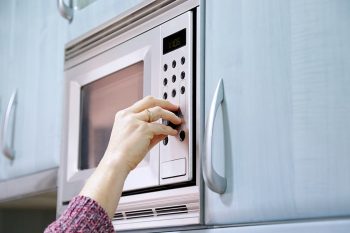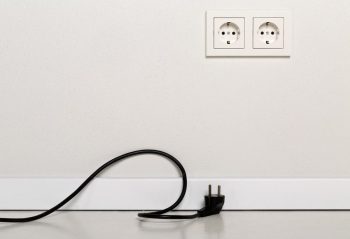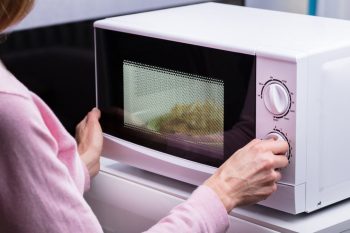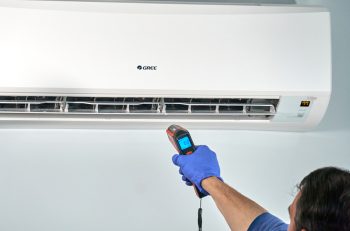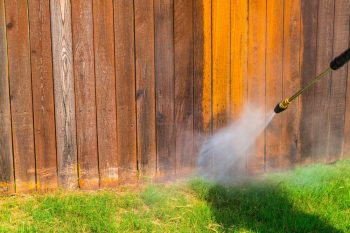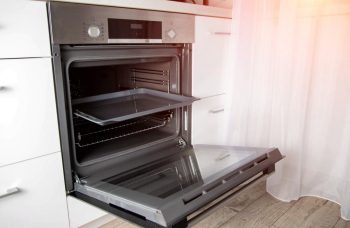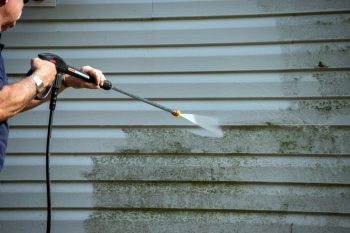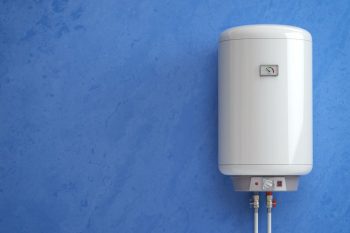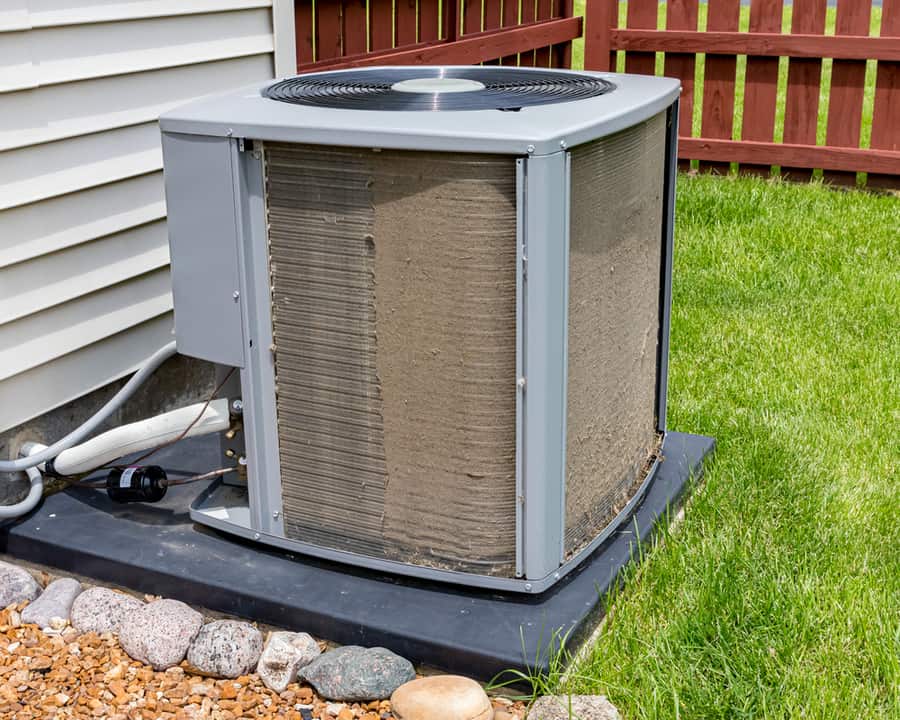
Air conditioners have become virtual home devices, especially during the summer. However, considering the units’ costs, a malfunction can be a huge problem that needs immediate attention.
Aircon units have a couple of components that are prone to failure, especially after prolonged use or the device is overworked. One of these parts that can affect the appliance’s performance is a bad condenser.
So, how do you identify issues with the AC condenser? First, we will examine some symptoms of when the condenser fails.
Do you think that your air conditioner’s condenser might have an issue?
Here are a few signs to look out for:
- Poor cooling performance.
- Condenser overheats.
- High energy bills.
- Coolant leaks.
- Loud or strange noises.
Your air conditioner must run efficiently to stay cool and comfortable in your house.
Regular maintenance can ensure that the climate control unit performs as expected.
What Is an Air Conditioner Condenser, and How Does It Work?
Air conditioners are essential devices when controlling house temperature and humidity for comfort. The condenser is, however, one of the essential parts that help in the climate control process.
The condenser includes a set of coils, fans, refrigerator lines, and fan motors. During the cooling cycle, the refrigerant absorbs heat from the air in the evaporator coils, which is then released into the condenser.
The refrigerant leaves the evaporator coils and is pumped into the condenser. The condenser fan blows cold air onto the coils, where the heat is dissipated. Next, the cooled refrigerant is pumped into the evaporator, and the cycle continues.
The location of the condenser depends on the type of device you own. For smaller appliances, like windows or portable ACs, the condenser is integrated into the device and works as one unit.
However, in larger devices like HVACs, and central or split ACs, the condenser is in the outdoor unit.
5 Warning Signs of a Bad AC Condenser
A problem with your condenser should be dealt with immediately. Failing coils or a condenser fan can reduce the performance of your air conditioner, leading to inefficiency.
A poorly performing unit can also affect your health and the structural integrity of your property.
Here are a few early signs that can help you identify issues with your air conditioner condenser:
1. Poor Cooling Performance
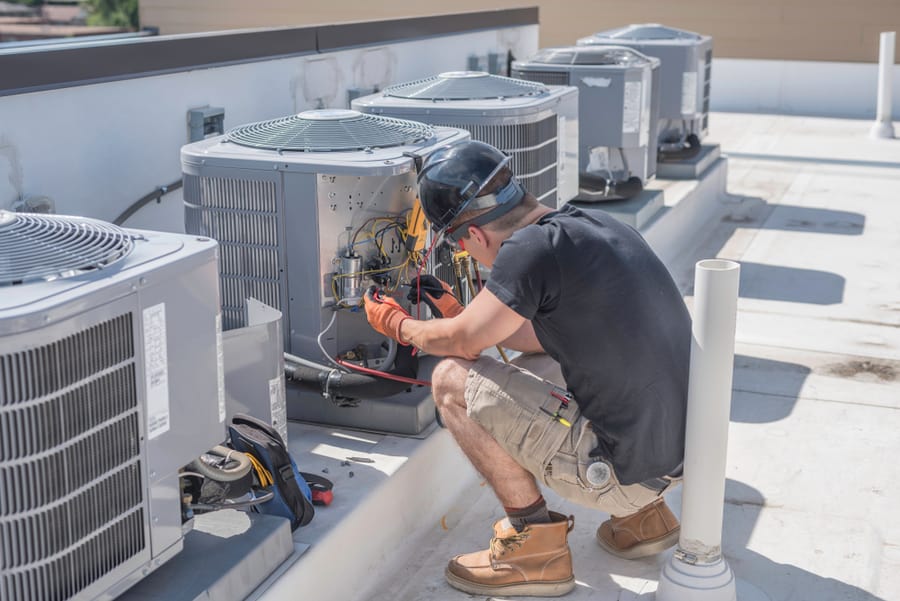
Poor cooling performance is one of the first things you will notice if your condenser starts acting up. This results from inadequate heat exchange throughout the cooling cycle.
When the condenser is faulty, insufficient heat is removed from the coolant, causing the hot refrigerant to circulate in the system.
As the refrigerant enters the evaporator coils, it has issues absorbing heat, leading to insufficient cooling in the room.
Likewise, it is common for the unit to have more frequent cooling cycles. This is because the compressor will turn on and off more times than normal as it tries to compensate for the insufficient cooling throughout the house.
2. Condenser Overheats
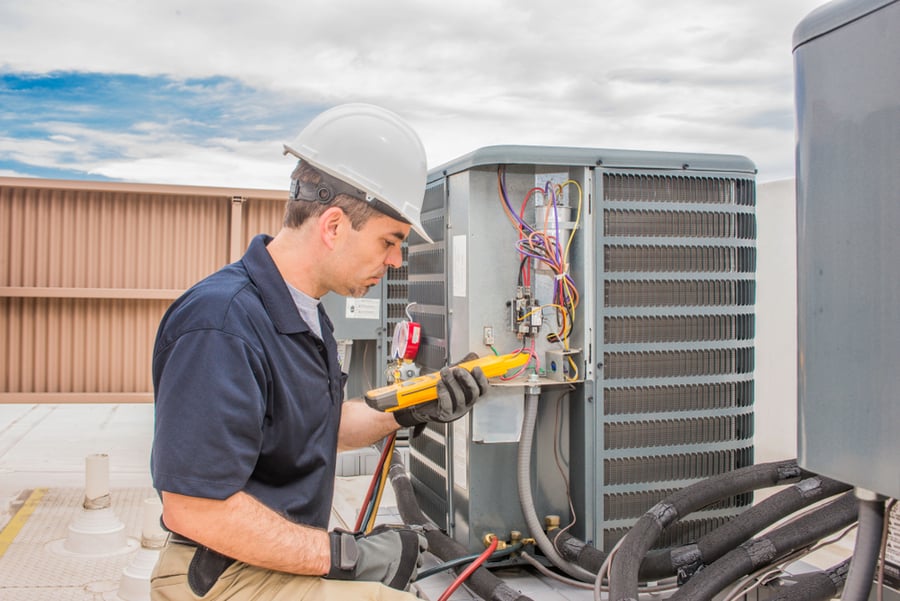
Secondly, if your condenser is overheating, it might be time to get it looked at.
As we previously stated, the condenser removes heat from the refrigerant. If the heat transfer process is impaired, it can lead to heat accumulation around the unit. This can cause the condenser and its coils to overheat.
Damaged or blocked condenser coils, a fan, or a fan motor can lead to the unit working harder to dissipate all that heat outside.
3. High Energy Bills

Furthermore, you might also notice a spike in your energy bills as your condenser’s health deteriorates.
The AC compressor is responsible for pumping coolant throughout the unit. Once the desired temperature is achieved during the cooling cycle, the thermostat turns off the compressor pump to save energy.
However, if the condenser is damaged, the unit will need more cooling cycles to maintain the room temperature.
The overworking and overheating system will need to frequently run the compressor to pump refrigerant, trying to cool the system. In the process, you might notice an increase in your utility bills.
4. Coolant Leaks
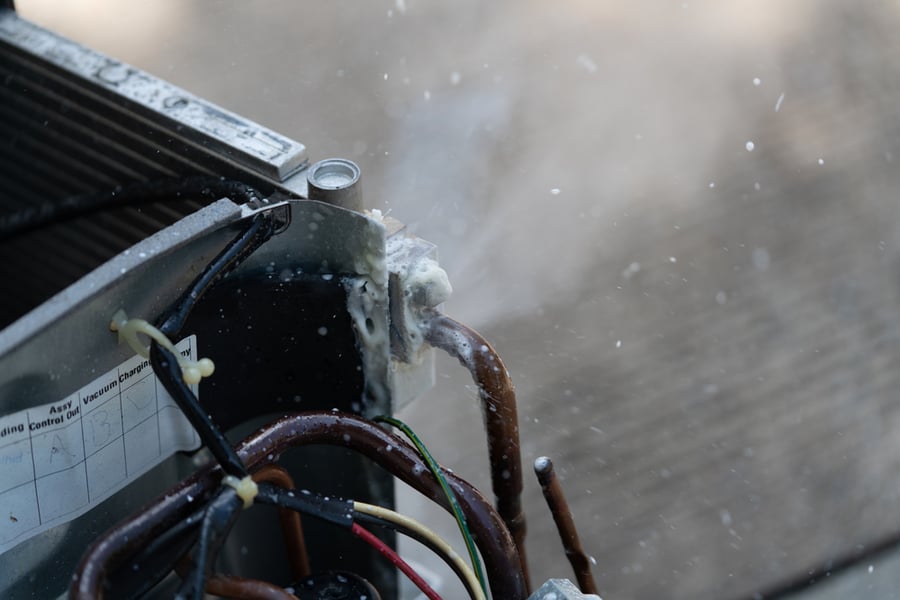
In addition, condenser issues can also include coolant leaks.
Coolant pumped from the compressor can easily sip through cavities, cuts, or breaks on the coils if your condenser is damaged or faulty. In addition, corrosion and wear can lead to condenser tearing, which stresses the air conditioner more.
Sadly, leaking refrigerant can also lead to other issues, like frozen pipes in the climate control pipes. In addition, low refrigerant levels lead to an insufficient heat transfer process.
Over time, evaporator coils cannot defrost condensate, leading to ice formation.
5. Loud or Strange Sounds
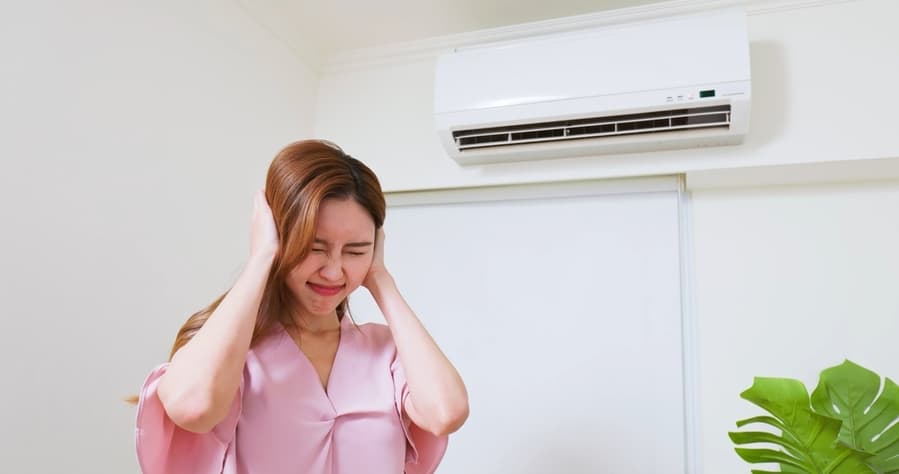
Failing air conditioner condensers can also make weird or loud noises. During normal operations, your air conditioner will make some soft humming noises.
However, squealing, rattling, or grinding noises should be something you have an HVAC professional look at. In most cases, these sounds are made when a unit undergoes wear and tear and parts get displaced within the system.
As these tiny parts get carried within the unit, they knock around other components making the rattling.
Moreso, cuts or breaks in the refrigerant pipes can cause a hissing sound as the coolant pressure escapes through the crack.
In addition, if the capacitors or relay switch in the AC are damaged, you might also notice more clicking sounds as the compressor tries to turn on and fails.
When To Replace or Repair Your AC Condenser
The air conditioner outside the unit is pretty sensitive. So if you have a problem with your condenser, the best option is to call an HVAC repair expert to look at your device.
However, some factors can affect the attention needed on your AC condenser.
Let us look at when you need to repair or replace your unit.
1. Repairing Your AC Condenser
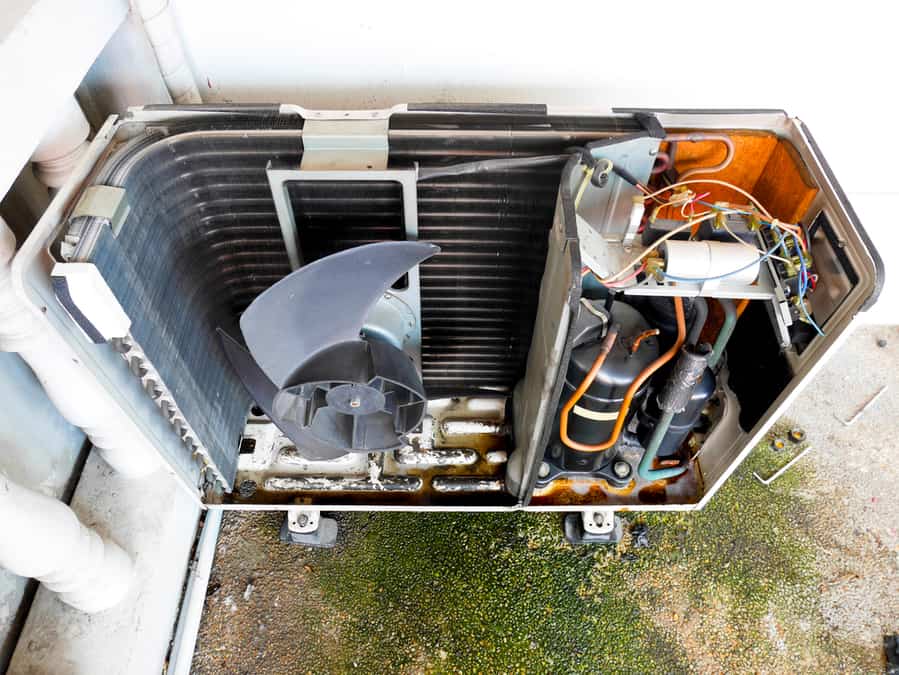
In most cases, repairing a condenser can save you a few bucks rather than replacing a part or the whole AC unit. Here are a few things that can help you make that decision.
Dirty Condenser: When the condenser coils, fan, or motor get clogged with dirt or leaves, it affects its heat transfer capability, affecting the condenser’s efficiency. However, protecting and cleaning the outdoor unit can help improve the AC’s performance and durability.
Defective motor: The condenser fan motor blows cool air around the coils, removing excess heat from the refrigerant fluid. If you suspect the condenser motor is defective, replacing it should get the device working efficiently in no time.
Bad relay switch or capacitor: A faulty capacitor and a relay switch can affect how efficiently the aircon turns on, leading to cooling cycle problems. However, replacing a bad relay switch and capacitors is easy for your AC technician.
2. When To Replace Your AC Condenser
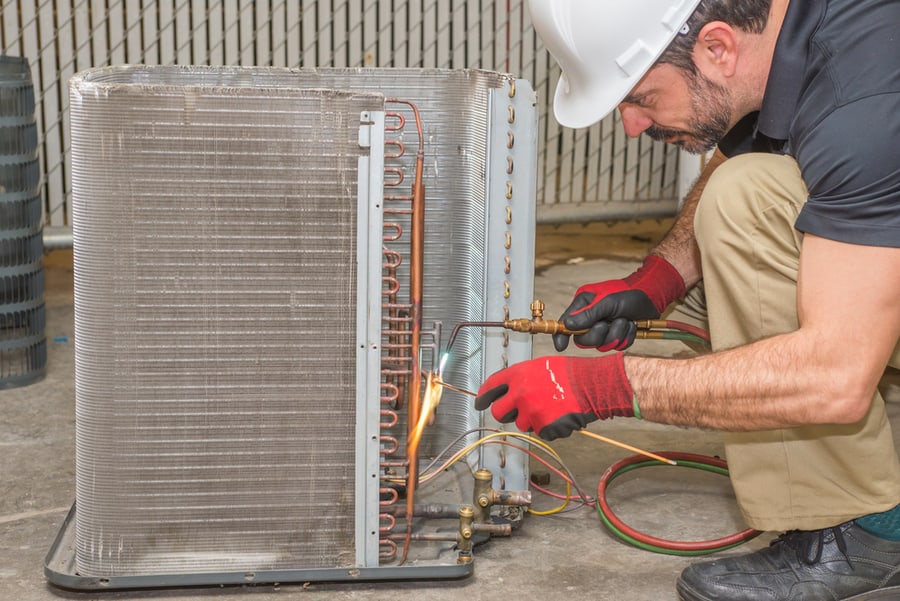
On the other hand, if you want to improve your AC performance, you might be forced to replace the condenser. Here are a few factors to consider:
Damaged coils: One of the worst things that can happen to your coil is rusting or corrosion. If the condenser coils or fins are damaged, they must be replaced to improve heat transfer.
Severe leaks: Likewise, if the coils or refrigerant pipes leak coolant, they must be replaced. Clogged or broken pipes can be hard to seal securely, so we recommend replacing the parts with genuine original equipment manufacturer (OEM) parts for your AC model.
Discontinued refrigerant: If your refrigerant fluid was discontinued, you might need to replace the air conditioning condenser unit. In 2020, the Environmental Protection Agency (EPA) started phasing out Freon coolant (R-22) due to environmental concerns.
If you own an air conditioner that relies on the coolant, you might need to replace the condenser and some of the unit’s other parts to comply with the new regulations.
Summary
The condenser is one of the most vital parts of your aircon unit. Therefore, condenser issues should be addressed immediately to prevent the unit from performing inefficiently or breaking down.
If you think you have a malfunctioning condenser, you will notice that your air conditioner has a problem with cooling performance, and the outside unit is overheating.
Furthermore, condenser problems can lead to higher utility bills, refrigerant leaks, and strange noises.
Frequently Asked Questions
What Causes an AC Condenser To Fail?
An air conditioner condenser can fail due to multiple reasons. They include:
- Blocked condenser coils.
- Failing condenser fan or motor.
- Damaged condenser.
- Leaking refrigerant.
- Frozen pipes or evaporator coils.
- Old air conditioner.
What Is the Function of a Condenser in HVAC?
The condenser is responsible for one of the heat transfer processes in the air conditioner. As refrigerant gets pumped into the condenser, the fan blows cold air along the condenser coils, where heat is removed and dissipated.
The cold refrigerant is pushed to the expansion valve, which is expanded to a cold gas that absorbs heat from the air in your house.

